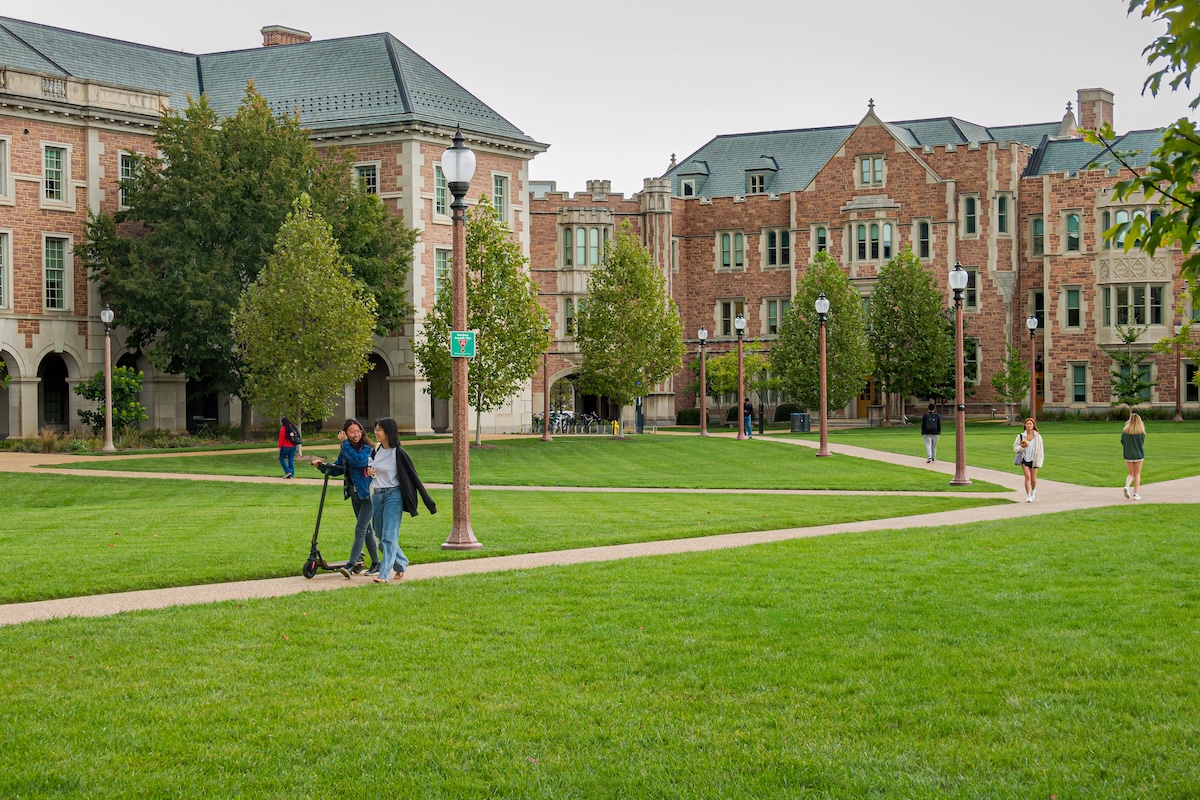
College students, families, and universities continue to navigate changing higher education policies and the challenges of funding and campus development. Here’s a quick look at the most important stories shaping higher education and student personal finance on October 25, 2025.
🎓 Top headlines at a glance
- Washington University in St. Louis rejects Trump’s federal high school “charter” over academic freedom concerns. We talked about the Higher Education Agreement last week.
- New research shows that most students pay for non-degrees out of pocket.
- The federal shutdown continues to disrupt the university’s funding and research.
- Nearly half of Harvard’s incoming class will attend tuition-free under current aid policies.
- Department of Education approves resumption of student loan forgiveness for 2.5 million borrowers.

A student walks on campus at the University of Washington in St. Luce.
1. Washington University in St. Louis rejects the new federal “compact.”
Washington University in St. Louis certain She will not sign the Trump administration’s proposed agreement for academic excellence in higher education. In a statement this week, Chancellor Andrew D. Martin The Convention”It is not consistent with our mission“It raised concerns about restrictions on academic freedom, diversity and international cooperation.
➡️ impact: The move adds Washoe University to a growing list of institutions rejecting the charter, joining MIT, Brown, and Dartmouth. These organizations may face restrictions on federal funding associated with compliance.
2. The report finds that most students pay out-of-pocket for non-college credentials
new He studies Strada Education and the Lumina Foundation found that nearly two-thirds of adults seeking certificates, boot camps or short-term credentials pay the costs themselves rather than receive support from an employer or government. The trend highlights both the popularity and financial pressures of pursuing non-college paths in an uncertain job market, the researchers said.
➡️ impact: While many programs advertise positive career outcomes, a lack of financial aid options may leave students without the safety nets available to their degree-seeking peers.
3. Federal shutdown worsens, colleges report pressure on funding
As the federal government shutdown enters its fourth week, universities are reporting increasing financial pressures. For example, The University of Hawaii must compensate employees’ salaries This is missing due to the closure. Georgia Tech has created a file Closing page To highlight its activities. Officials say prolonged inaction could delay important research linked to National Science Foundation and Education Department programs.
➡️ impact: Public universities and research institutions face increasing uncertainty as funding pauses and federally funded projects stall.
4.Nearly half of Harvard’s class of 2029 will take free classes
Harvard University Announce That 45% of the Class of 2029 will attend tuition-free under the institution’s need-based financial aid policies. The class also recorded a record overall production rate of 83.6%, with international students achieving a production rate of 90.3%. The university continues its policy that families with incomes of less than $85,000 per year pay nothing for tuition, housing, or fees.
➡️ impact: The numbers underscore the strong demand for elite universities even amid national scrutiny of the costs of higher education, and highlight how financial aid remains a critical factor in access and affordability.
5. The Ministry of Education resumes loan forgiveness for 2.5 million borrowers
The U.S. Department of Education has agreed to resume loan forgiveness processing for about 2.5 million borrowers after a settlement with the American Federation of Teachers (AFT). The agreement ends months of legal uncertainty over stalled discharges under income-based repayment plans such as IBR, PAYE and ICR.
➡️ impact: Eligible borrowers will see the loans forgiven and will not owe federal income tax on the forgiven balances, as current law excludes this forgiveness from taxable income until 2025.
Related reading:
37% of Google AI Finance answers are inaccurate in 2025
The IBR rule change was delayed due to technical issues
Government shutdown and student loans explained (2025 update)
Editor: Colin Greaves
The post This Week in College and Money News: October 24, 2025 appeared first on The College Investor.




